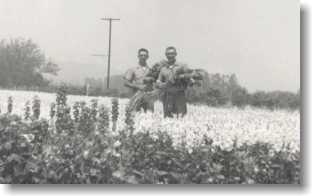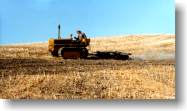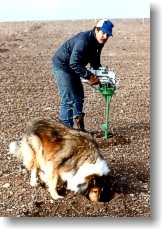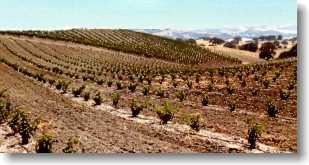|
  Joe
(Giu) quickly learned that while farming supported the family, it was
winemaking
that was at his heart. Wine well made in the manner of his father in
the
hills above Genoa, wine drunk with respect to the power of the wine,
wine
shared with family and friends. Now the brothers, Gino and Joe, seek to
produce not just wine, but great wines. Joe
(Giu) quickly learned that while farming supported the family, it was
winemaking
that was at his heart. Wine well made in the manner of his father in
the
hills above Genoa, wine drunk with respect to the power of the wine,
wine
shared with family and friends. Now the brothers, Gino and Joe, seek to
produce not just wine, but great wines.
Gino and Joe come from a family particularly fond of wines that are big and red. They believe that to make great wine, one must have great grapes. Starting in 1972, they began a serious effort to locate an ideal vineyard site. Beginning as far north as Washington State and continuing all the way to Temecula, California, every area was personally visited by one of the brothers. Looking
for a climate with enough warmth to ripen big flavors, but cool enough
to keep the wine balanced, California soon became the focal point. It
had
new areas outside Napa just The
hunt was on. Paso Robles has many distinct microclimates and
determining
the best area for premium grapes was a search the brothers undertook
with
great care. Scouting trips augmented by topographical maps began.
Temperatures
during the growing season were measured in areas east and west of
Highway
101. Every trip the net closed tighter around the sites deemed worthy.
The
field rolled up in hills from Arbor Road, perfect for the cold air to
run
down and away from the young vines in Spring. It was in an air corridor
that receives cooling afternoon breezes from the Using
a one person auger, holes were dug 24" deep for bare root vines. With
no
other The
hillside location of the vines was key. With less loamy topsoil, the
vines
work harder. With hillsides, excess rainfall runs away from the vines
and
the cold Spring air doesn't threaten tender emerging leaves. In the
beginning,
drip irrigation was needed for the young vines until the roots were
established The first harvest of grapes was delayed as the young vines were cultivated for deep roots. Deep roots make the vines less susceptible to the hot afternoon sun, so mature vines require little or no irrigation. Nature usually provides ample rainfall at this location. Extra watering leaves the grapes with a bigger berry size, but more flavor is developed with a higher skin to pulp ratio, as the flavor and color are not in the pulp, but in the skin. Just as a peach tree gives tasteless fruit when over watered, it is the same with grapes. Our family's long experience in farming tell us that more water is not always better!
|
 beginning
to receive attention, including Paso Robles. Historically home of
intense
Zinfandels, in the mid-1960's there were new plantings of French
varietals,
with Andrew Tchelistcheff consulting. This intrigued the Peratas, as it
wasn't Zinfandel being planted, but Cabernet Sauvignon, Joe's favorite.
beginning
to receive attention, including Paso Robles. Historically home of
intense
Zinfandels, in the mid-1960's there were new plantings of French
varietals,
with Andrew Tchelistcheff consulting. This intrigued the Peratas, as it
wasn't Zinfandel being planted, but Cabernet Sauvignon, Joe's favorite.

 Pacific
Ocean just 25 miles west. And to their father, it looked like their
ancestral
home near Genoa. The soil and microclimate were perfect for premium
grapes.
The 40 acre parcel was purchased in 1977 and was painstakingly cleared
and surveyed.
Pacific
Ocean just 25 miles west. And to their father, it looked like their
ancestral
home near Genoa. The soil and microclimate were perfect for premium
grapes.
The 40 acre parcel was purchased in 1977 and was painstakingly cleared
and surveyed. Planting began in 1980 with Zinfandel as the a focus. The initial
planting
was 25 acres, 520 vines per acre.
Planting began in 1980 with Zinfandel as the a focus. The initial
planting
was 25 acres, 520 vines per acre.
 vineyards
nearby (then!), vines were planted on their own roots. Each
vine was planted by a family member, each grapestake was pounded into
the
rocky soil by Gino, every trellis wire and irrigation line carefully
positioned
by the Peratas. A fence was built to keep deer and rabbits out of the
new
planting
vineyards
nearby (then!), vines were planted on their own roots. Each
vine was planted by a family member, each grapestake was pounded into
the
rocky soil by Gino, every trellis wire and irrigation line carefully
positioned
by the Peratas. A fence was built to keep deer and rabbits out of the
new
planting 


